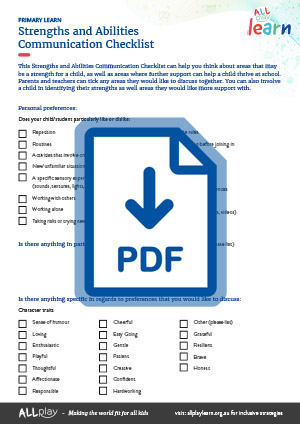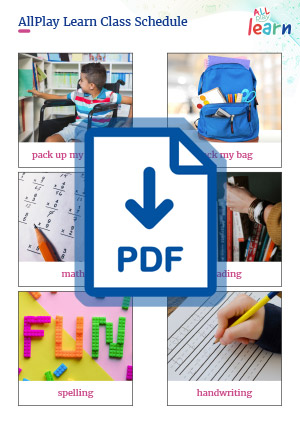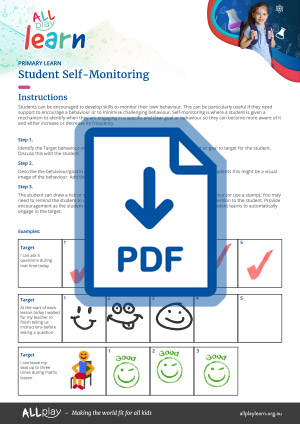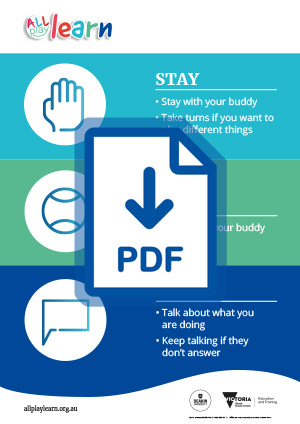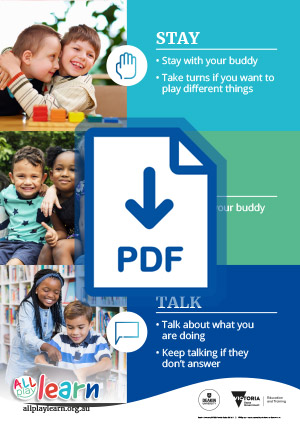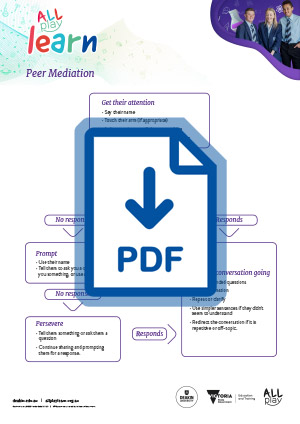
Intellectual Disability
On this page:

About intellectual disability
Students with intellectual disability find it harder to learn, which means they need extra time and help to learn new skills. While intellectual disability can look different from one student to another, students with intellectual disability may experience differences in their:
- Thinking and organisation. Students with intellectual disability will typically experience difficulties in some form with thinking skills, such as attention, reasoning, problem solving, memory, planning, and judgement (e.g. understanding and predicting risks). This can impact the speed or way in which they best learn, and they tend to need extra time and help to learn new skills or knowledge (e.g. reading, maths). Some students may be easily distracted and need support with organisation, or they may find instructions with several steps hard to follow. Students with intellectual disability often prefer concrete learning tasks, and multi-modal or hands-on learning tasks.
- Communication and social skills. Students with intellectual disability may seem socially immature for their age, and they may find it difficult to understand body language (e.g. facial expression, gestures). Some students might have lots of language and others might only use a few words or no words.
- Emotions and behaviour. Some students can find it challenging to manage their emotions and behaviour, or to recognise and respond to the emotions of others. Some students may be gentle and calm, while others may become frustrated or distressed and engage in challenging behaviours. Students with intellectual disability may experience low self-confidence or depression, anxiety or frustration if they consistently find they are unable to complete a task or have their needs met.
- Practical skills. Some students may need support and lots of opportunities to practise practical skills, such as dressing, eating or toileting, or telling the time and handling money.
- Health and movement. Some students may tire easily, particularly when there are many demands on them. They may find some motor skills difficult. Some may also be restless, or over-active.

Strengths
What might be some strengths?
- Many children with intellectual disability enjoy play, and learning through play.
- Children may show lots of interest in activities that involve play.
- They may have good fine and gross motor skill development through play.
Where might you provide support?
- They might need more time to think and understand. They might not understand instructions if they are given a lot of information at once.
- They may take longer to learn new skills. Structure and routine may help them.
- They can be very social and friendly, and like talking and spending time with other people. However, sometimes, they might stand too close or be overfamiliar with people.

Evidence-based strategies
Consider adjustments to communication style
Consider adjustments to activities and rules
Provide lots of opportunities to practise
Provide opportunities to work with their classmates
Build social skills
- Get student’s attention before communicating. When giving instructions or talking with students check that you have their full attention before beginning. This can be done out loud or with a gesture.
- Be clear and specific. It can be helpful to give clear and specific instructions about the task or behavior expected, and how much time they have to work in.
- Use visual instructions. Visual instructions about a task or behavior may help support some students. Consider demonstrating the task/behaviour, or asking another student to demonstrate. You could also use a visual schedule, poster or video to outline or model the task
- Some students may find it easier if they can use gestures. Some may need to point to the correct answer instead of talking.
- Give brief prompts immediately before each activity. It can be helpful to remind students what you want them to focus on in that activity.
- Give encouragement and correction. Consider giving positive feedback and correction immediately when children are learning a task or behaviour. This can be reduced gradually as they build their capability.
- Consider using least-to-most prompts. If a student isn’t sure of a response/task, prompts that gradually increase in the level of support and/or are provided at set intervals (e.g. after 5 seconds) can be helpful. For example, ‘least support’ prompts may be a broad open-ended question “which number comes next” whereas ‘most support’ prompts may be “point to the 6 - the 6 comes next”.
- Some tasks may need to be tailored to better engage a student. Tailor tasks for the student’s current level of understanding so they can achieve success.
- Adjustments to reading materials. Provide materials that are age-appropriate, and suitable for the reading level of a student. Using audiobooks and providing choices may support their engagement.
- Allow students to demonstrate understanding in multiple forms. Students can demonstrate understanding in ways that align with their strengths and abilities. For example, by making a poster, presentation or written report.
- Include child interests. For example, if a student is motivated by cars, offer a small bundle of toy cars for addition and subtraction. When the student completes their maths, encourage them with some time to play with the cars.
- Have a consistent routine. Routines help a student understand how to behave. Students often feel more secure when they know what to expect. Refer AllPlay Learn’s class schedule under relevant resources below.
- Use a token system. Consider giving tokens for correctly performed actions or behaviours. These tokens can be traded for something of interest to the child. Consider teaching the whole class how to self-monitor (recognise and record their individual completion of a specific behaviour/skill). Access AllPlay Learn’s self-monitoring form under relevant resources below.
- Embed learning opportunities and instructions across the naturally occurring routine of your classroom. Identify specific times and activities to provide instructions. Examples include when students are taking a break from or transitioning between activities.
- Consider using time delay programs or approaches. These are questions or problems that have a set amount of time for the student to answer. When the time is up, the correct answer is given.
- Students may need to practise a task or behaviour many times. Lots of time to practise in different settings and with different materials can help students learn to use that skill in other situations.
- Offer fewer tasks with more opportunities to practise. Offering fewer tasks with more time for students to learn and practise these tasks may be more helpful than offering many tasks with little opportunity to practise.
- Provide lots of opportunities for students to work together. Children with and without intellectual disability can get to know each other and build friendships when they work together. It also helps students learn through watching others.
- Allocate specific tasks within the group. Consider assigning tasks if a student with an intellectual disability uses tailored materials or instructions. You could also choose a group member to act as a tutor or mentor.
- Help students develop their social skills. Target skills may include speaking and listening, asking questions, and understanding and expressing emotions. Consider using a combination of video modelling, social stories, and roleplaying activities to teach these target skills.
- Teach students to express their needs and wants. Use prompting, video-modelling, and roleplaying to teach students to request items, activities, or assistance. Arrange the environment and identify students' interests and preferences to motivate and reinforce their efforts. Encourage students to use whichever mode of communication is most appropriate (e.g., picture cards, objects, writing, speech).
View examples of practice demonstrating how a teacher can use a strengths-based approach to apply evidence-based strategies to support a student with intellectual disability and a student with autism and intellectual disability.

Best practice tips
Provide a supportive environment
Reduce background noise when giving instructions
Simplify instructions and limit the information given at once
Ask parents
Use high probability command sequences
Promote self-determination
Use errorless learning procedures
- Children might lack confidence and may worry that they will not be able to keep up with other students. Praise efforts and encourage participation.
- Use our anxiety resource toolkit to recognise and support child anxiety.
- Avoid background noise and distractions while giving instructions to help all children hear and focus on you. You might need to face the students away from distractions behind you.
- Some children might need simple instructions which may need to be repeated lots of times. Use simple words and repeat. Learning a skill might require teachers to break it down into smaller parts at first.
- Talk to parents to find out the best way to communicate and work with their child. Parents can help you understand a student’s unique strengths and areas they need more support.
- Begin with brief, achievable tasks to increase motivation. Present children with tasks that are easy, quick, and likely to be completed, before presenting the target task. The momentum created through completing the initial task can increase children’s persistence and compliance with the target task. Provide recognition and encouragement.
- Promote self-determination. Empower and teach students to make choices, set goals, be independent, and develop problem-solving abilities. Use technology as needed. For example, technology can be used by students who communicate non-verbally to indicate preference.
- Errorless learning-based teaching may be more effective than trial-and-error-based teaching for some students. During errorless learning, students are not given the chance to make any errors. Instructions are followed immediately with a prompt to minimise the chances of an incorrect response (e.g., pointing or highlighting the correct answer for students). Prompts can be removed systematically over time until students can independently respond correctly.

Curriculum considerations
- Dance, drama and music classes let children participate with others in an environment that isn’t as dependent on academic skills. Consider providing lots of small group activities. Choosing who will be in each group or pair prevents a child with an intellectual disability from being left out or picked last.
- For more great tips and resources, check out AllPlay Dance.
- Children with an intellectual disability may need support with literacy skills. They may need one-to-one help using mnemonics (memory strategies) and flash cards, additional time to learn decoding/phonics, and lots of time to practise.
- Use self-regulated strategy development to help students with writing skills. First, present and discuss a writing strategy with students. Clearly model and help students understand and memorise this strategy (e.g., through a mnemonic device). Finally, support students to apply this strategy with increasing independence.
- Use visual supports and simple games (e.g., matching, sorting) to support and reinforce learning of new skills.
- Use phonic-based instruction. Teach students decoding strategies (e.g., associating letters with sounds, putting sounds together). Consider helping students memorise common, high-frequency words.
- Make reading interactive. Read text aloud to students, incorporating and posing questions and comments throughout. Consider breaking students into smaller groups to discuss and make meaning of the text. This could include students summarising, questioning, clarifying and making predictions about the text.
- Clearly explain and model the tasks and instructions. Break tasks into smaller components and model each step. Provide lots of opportunities to practise before proceeding to more difficult tasks and skills.
- See Consider adjustments to activities and rules (consider using time delay programs or approaches).
- A child with an intellectual disability may need simple instructions, demonstrations and prompts when learning new skills in physical education classes, or when playing sports games with a group. The demonstrations and prompts may need to be repeated lots of times. New skills may need to be broken down into smaller parts.
- Some students may need physical help with learning new tasks.
- Consider lots of pair or small group activities. Choosing who will be in each group prevents a child with an intellectual disability from being left out or picked last.
- Check out other tips shared by coaches at AllPlay Footy.
- Children with an intellectual disability may benefit from support including one-to-one help, and having instructions or information repeated lots of times.
- Children with an intellectual disability may need support with learning a new language.
- Assess whether learning a language will be advantageous to them on a case-by-case basis.
- If they learn a language, focus on areas of strength and build from there.
- They may need one-to-one help and instructions or information to be repeated lots of times.
- Children with an intellectual disability may benefit from one-to-one help, and having instructions or information repeated lots of times.
- Use clear language to explain tasks and instructions.
- Divide learning into smaller, sequential steps with lots of repetition. Break down harder skills into smaller, more manageable steps. Carefully plan lessons to progress from easier to more difficult tasks. Present students with similar questions and activities until they show the target level of mastery before progressing to the next level.
- Visual representations, such as graphic organisers, could be useful in helping students organise information and learn the connection between different concepts.
- Children with an intellectual disability may benefit from one-to-one help, and having instructions or information repeated lots of times.
- Children with an intellectual disability may may need support with numeracy. Immediate encouragement and correction, and lots of time to practise, may help.
- Consider how to provide clear and short wording of maths problems. For example, using different ways of describing the same object may be confusing. For example, 'he took away three carrots, how many vegetables does he now have?'.
- Some children with an intellectual disability will learn well through sensory learning. This might include pointing to touch points on a written number (dots/lines that they can count embedded into a number) or looking at a picture that shows the maths problem. Using manipulatives and visuals can be helpful in presenting and explaining new concepts and solving problems.
- Clear and exact instructions for strategies or methods for solving problems may be helpful. For example, consider modelling how to solve a maths problem while talking through the problem-solving steps you are taking. Children may need to be taught how to use those strategies across different problems.
- Divide learning into smaller, sequential steps with lots of repetition. Break down harder skills into smaller, more manageable steps. Carefully plan lessons to progress from easier to more difficult tasks. Present students with similar questions and activities until they show the target level of mastery before progressing to the next level. Use prompts and feedback to maximise the chances of students performing the target skill. Provide recognition of their efforts and encouragement.
- Consider pairing a child with another student who can demonstrate maths skills and give instructions or help. See AllPlay Learn’s Peer Mediation and Group Work for important tips for pairing children.
- See Consider adjustments to communication style (consider using least-to-most prompts), and Consider adjustments to activities and rules (consider using time delay programs or approaches)

Other considerations
First aid
Friendships
Safety drills
Behaviour
Toileting
Homework
School camps
Transitions
Other co-occurring conditions
- A child with an intellectual disability may have difficulty communicating that they are in pain or unwell. Watch for signs of pain such as grimacing. Encourage gestures or other methods of communication to work out what may be happening.
- Read more about how peer mediation and group work can support peers with learning social and communication skills that facilitate the inclusion of children with disabilities.
- Some children with an intellectual disability may not know how to tell an adult if there is an emergency, or what to do in an emergency or emergency drill. Consider making time for demonstrating and practicing what to do.
- Some children may not complete their work or they may engage in disruptive behaviour (e.g. call out during class). Giving children choices in their work may make them more motivated and less likely to be distracted. Showing them positive behaviour and giving them clear instructions so that they know what is expected may also help.
- Picture cards or stories about social situations can teach children about positive behaviour.
- Many children can be taught how to self-monitor their behaviour. Consider asking them to record whether they have done what they were asked to do.
- Refer to the ABC approach for more information on how to reduce challenging behaviour by supporting the child and promoting more helpful behaviour, and our emotions page for more information about supporting a child with managing their emotions.
- Some children with an intellectual disability may need extra help with toileting. Discuss with parents what help their child may need.
- Consider student strengths and challenges. Some children may find completing homework without help difficult. Work out what a child is able to do without help when assigning homework. Alternatively, consider not giving homework to the class to give the child some time away from books.
- Some children with an intellectual disability may need extra help on camps. Discuss with parents what help their child may need.
- A child with an intellectual disability may benefit from supports when moving across education settings.
- It may be helpful to teach and practice organisation and homework skills, and time- and self- management skills.
- For more information about supporting students with disabilities when transitioning to a primary or secondary school setting access AllPlay Learn's transition page.
- For children transitioning to primary school access AllPlay Learn's Story A school day, and for children transitioning to secondary school access Access AllPlay Learn’s story How to be organised
- Some children with an Intellectual disability may also be diagnosed with autism, anxiety, cerebral palsy, Attention-Deficit/Hyperactivity Disorder (ADHD) or oppositional defiant disorder.

Relevant resources
Visit our resources page for a range of resources that can help to create inclusive education environments for children with disabilities and developmental challenges. AllPlay Learn’s stories can help children with intellectual disability become familiar with primary school and some of the skills they need to participate in these settings. Other relevant resources for children with intellectual disability are:

